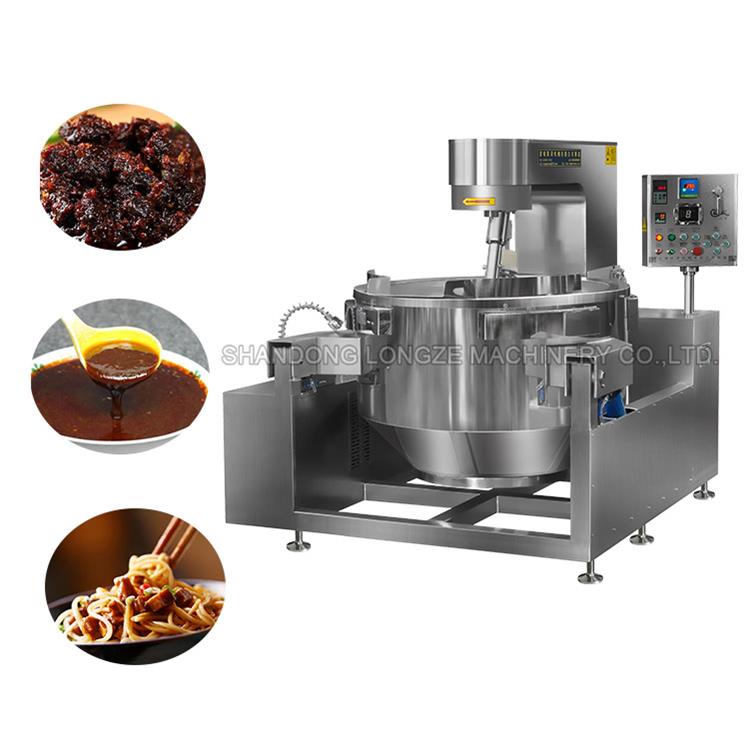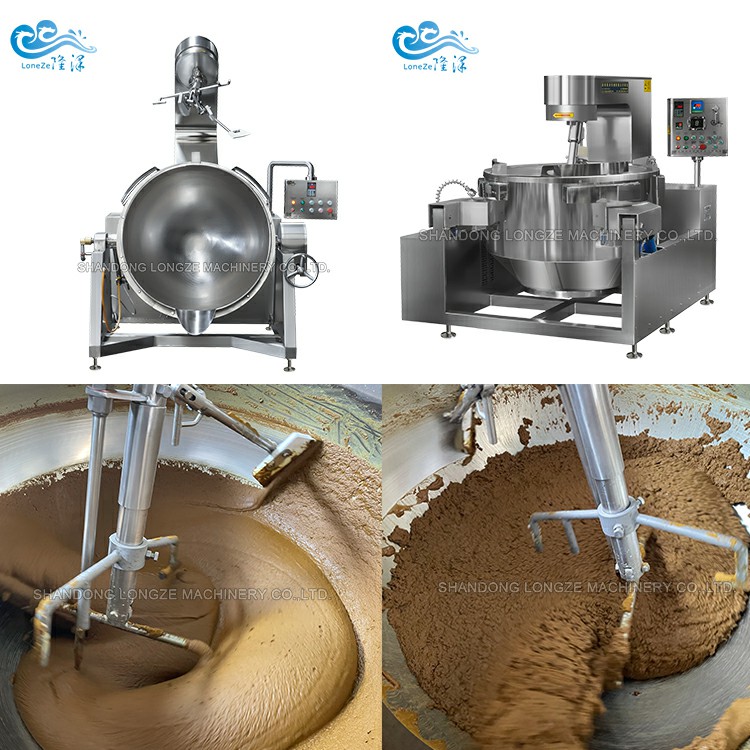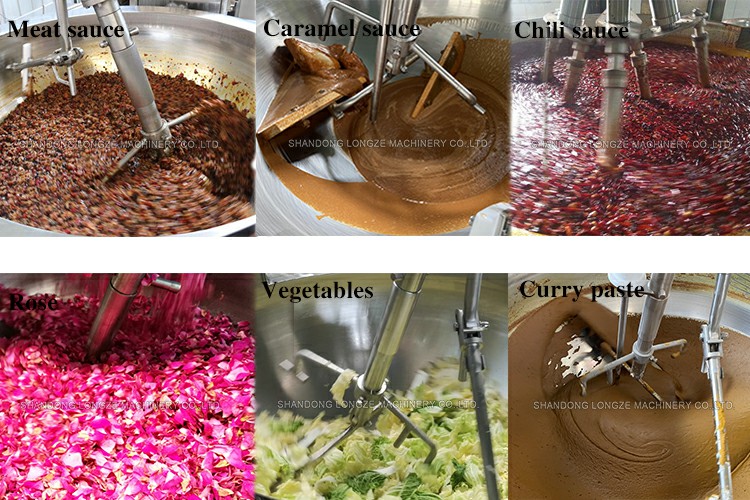Writer:www.firemixer.com Time:2021-08-01 17:01 Browse:℃
How to distinguish the authenticity of the stainless steel material of the jacketed kettle?
Now when buying a jacketed kettle, everyone cares about more and more things, such as how much power consumption, how fast the motor rotates, how flexible the tilt is, etc., but the most concerned issue is the material of the jacketed kettle. Now Most of the jacketed kettles on the market are stainless steel jacketed kettles, so whether the jacketed kettles I made are made of 304 stainless steel is very important, but how to judge this is now explained by Longze Machinery.

The physical identification of stainless steel plate is to determine whether it is based on the inherent physical and chemical properties of the product (including the whole material, residual material, waste, etc.) with the help of simple instruments and the senses when the steel grade (number) is unknown. It is not the specific method of stainless steel and which type of stainless steel.
It should be pointed out that sensory identification cannot distinguish the specific steel (type) number, but can only basically distinguish three major categories of chromium stainless steel, chromium nickel stainless steel and chromium manganese nitrogen stainless steel. The identification methods are as follows:
1. The difference in color:
The pickled stainless steel has a silvery white and smooth surface color: chromium-nickel stainless steel is silvery white and jade; chromium stainless steel is slightly grayish and weak; the color of chromium-manganese-nitrogen stainless steel is similar to that of chromium-nickel stainless steel. The surface color of stainless steel that has not been pickled: chrome-nickel steel is brown-white; chrome steel is brown-black; chromium-manganese-nitrogen is black (the three colors refer to the color with heavier oxidation). Cold-rolled unannealed chromium-nickel stainless steel, with silver-white reflective surface. Except for stainless steel, stainless steel is generally white after pickling.
2. Identify with copper sulfate:
The method is to remove the oxide layer on the steel, put a drop of water, wipe it with copper sulfate, if it does not change color after wiping, it is generally stainless steel; if it turns purple: non-magnetic is high manganese steel, magnetic is generally ordinary steel Or low alloy steel.

3. Use magnetite to identify:
Magnet can basically distinguish two types of stainless steel. Because chromium stainless steel can be attracted by magnets in any state; chromium-nickel stainless steel is generally non-magnetic in the annealed state, and some will be magnetic after cold working. However, high manganese steel with higher manganese content is non-magnetic; the magnetic situation of chromium-nickel-nitrogen stainless steel is more complicated: some are non-magnetic, some are magnetic, and some are non-magnetic in the longitudinal plane and magnetic in the transverse plane. Therefore, although magnets can basically distinguish between chromium stainless steel and chromium-nickel stainless steel, they cannot correctly distinguish some special steel grades, let alone specific steel grades.
For steel grades with special properties, we still need to take the following three methods to identify them.
1) Grinding identification:
grinding pattern identification is to grind stainless steel on a grinder and observe the sparks. If the spark is streamlined and has more dense knots, it is high manganese steel or manganese nitrogen steel with higher manganese content; if there are no knots, it is chromium steel or chromium-nickel stainless steel.

2) Identification by annealing method:
Cold-worked chromium-nickel stainless steel, if it has magnetism, can take a small piece to boil it red in a fire and let it cool naturally or put it in water (annealing). Generally speaking, the magnetism will be significantly weakened or disappear completely after annealing. However, some chromium-nickel stainless steels, such as Cr18Ni11Si4AlTi steel and Cr21Ni5Ti steel, contain more ferrite elements, and a considerable part of their internal structure is ferrite. Therefore, it is magnetic even in the state of hot working.
3) Identification by chemical qualitative method:
The chemical qualitative method is an identification method to identify whether there is nickel in magnetic stainless steel. The method is to deeply dissolve small pieces of stainless steel in aqua regia, dilute the acid with clean water, add ammonia to neutralize it, and then gently Inject nickel reagent. If there is a red velvet-like substance floating on the liquid surface, it means that the stainless steel contains nickel; if there is no red velvet-like substance, it means that there is no nickel in the stainless steel. (However, due to the low nickel content in stainless steel, generally only a few percent, the content of nickel is not easy to reveal or determine how much, and it is generally necessary to use standard samples for many experiments to grasp.)
The above identification methods explain: the identification of stainless steel by the sensing tube requires not only a comprehensive test of several methods, but also the test results can only determine a certain type of stainless steel, and it is impossible to determine which alloy elements and specific contents are contained in the steel. Therefore, the method of sensory identification is currently extremely imperfect, and some may be wrong, and there are many physical phenomena that are only known but do not know why, and need to be further explored.
The best way to correctly distinguish the stainless steel grades is to go deep into the investigation and research of the relevant processing units, consult their material managers and worker masters, understand the steel grades used, carefully check the steel number marks on the steel, and check the original Information, etc., this is the fundamental method to correctly distinguish the stainless steel grade and quality. For alloying elements and content that have large differences, they are required to be stacked separately to facilitate rational use and avoid unnecessary losses and waste.
Regarding how to identify the pros and cons of stainless steel, if the individual is to identify the specific material of stainless steel, it is impossible to identify it, and it must be chemically analyzed. Some, such as 400 series and 300 series, can be identified by magnetism. 400 series is generally magnetic, and 300 is generally non-magnetic.
In this way, the material of the double jacketed kettle is no longer an important issue that restricts procurement. If you are still worried about the material of the jacketed kettle, here is the best answer
Whatsapp/Wechat: +8615621793520
Phone: +8615621793520
qq: 3206879011
Email: Raymond@loneze.com
Add: No.215, Zhanqian Street, Zhucheng City, Weifang City, Shandong Province, China